| The Frontier, the West, and the American Experience Reading with Questions |
|---|
| www.studenthandouts.com ↣ American History ↣ American History Readings with Questions |
The frontier—the point at which settled territory met unoccupied land—began at Jamestown and Plymouth Rock. It moved in a westward direction for nearly 300 years through densely forested wilderness and barren plains until the decennial census of 1890 revealed that at last the United States no longer possessed a discernible line of settlement.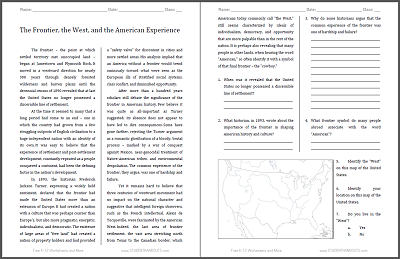 At the time it seemed to many that a long period had come to an end—one in which the country had grown from a few struggling outposts of English civilization to a huge independent nation with an identity of its own. It was easy to believe that the experience of settlement and post-settlement development, constantly repeated as a people conquered a continent, had been the defining factor in the nation's development.
At the time it seemed to many that a long period had come to an end—one in which the country had grown from a few struggling outposts of English civilization to a huge independent nation with an identity of its own. It was easy to believe that the experience of settlement and post-settlement development, constantly repeated as a people conquered a continent, had been the defining factor in the nation's development.In 1893, the historian Frederick Jackson Turner, expressing a widely held sentiment, declared that the frontier had made the United States more than an extension of Europe. It had created a nation with a culture that was perhaps coarser than Europe's, but also more pragmatic, energetic, individualistic, and democratic. The existence of large areas of "free land" had created a nation of property holders and had provided a "safety valve" for discontent in cities and more settled areas. His analysis implied that an America without a frontier would trend ominously toward what were seen as the European ills of stratified social systems, class conflict, and diminished opportunity. After more than a hundred years scholars still debate the significance of the frontier in American history. Few believe it was quite as all-important as Turner suggested; its absence does not appear to have led to dire consequences. Some have gone farther, rejecting the Turner argument as a romantic glorification of a bloody, brutal process – marked by a war of conquest against Mexico, near-genocidal treatment of Native-American tribes, and environmental despoliation. The common experience of the frontier, they argue, was one of hardship and failure. Yet it remains hard to believe that three centuries of westward movement had no impact on the national character and suggestive that intelligent foreign observers, such as the French intellectual, Alexis de Tocqueville, were fascinated by the American West. Indeed, the last area of frontier settlement, the vast area stretching north from Texas to the Canadian border, which Americans today commonly call "the West," still seems characterized by ideals of individualism, democracy, and opportunity that are more palpable than in the rest of the nation. It is perhaps also revealing that many people in other lands, when hearing the word "American," so often identify it with a symbol of that final frontier—the "cowboy." Questions with answers in bold: 1. When was it revealed that the United States no longer possessed a discernible line of settlement? 1890 2. What historian, in 1893, wrote about the importance of the frontier in shaping American history and culture? Frederick Jackson Turner 3. Why do some historians argue that the common experience of the frontier was one of hardship and failure? Answers will vary; 4. What frontier symbol do many people abroad associate with the word "American"? Cowboy; 5. Identify the "West" on this map of the United States. On map; 6. Identify your location on this map of the United States. Answers will vary 7. Do you live in the "West"? Answers will vary Click here to print. |
 | 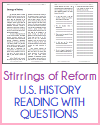 | 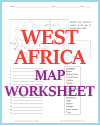 | 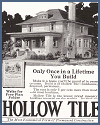 | 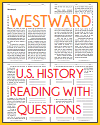 | 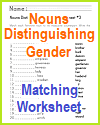 |
| www.studenthandouts.com ↣ American History ↣ American History Readings with Questions |








